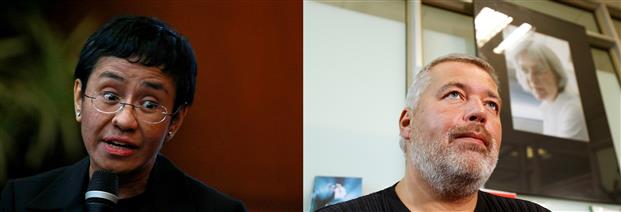
Rappler CEO and Executive Editor Maria Ressa and Novaya Gazetas editor-in-chief Dmitry Muratov. - Reuters file photos
FOR this year’s Nobel Peace Prize, the Norwegian committee has chosen two journalists who have been fearlessly going about their business of unearthing and propagating some hard truths despite threats to life and repression unleashed by their respective all-powerful regimes. It is an encouraging recognition of the freedom of expression and fact-based journalism as being the bedrock of democracy, and of peace. The selection acknowledges the disturbing escalation in intolerance to voices of dissent by most governments worldwide as they employ questionable means to buy out or subjugate and gag mediapersons (including targeted incarceration and murders) who dare to expose their black deeds in search of the truth.
Even as consumers are assailed by a confounding bombardment of news and views that are inextricably interspersed with fake news and propaganda, peace awardees Maria Ressa of the Philippines and Dmitry Muratov of Russia stand out for keeping the flag of fact-based journalism flying. Undeterred by authoritarian pressure and a volley of legal cases, Ressa, the co-founder of news portal Rappler, has been at the forefront of a series of investigative stories that shine light on the Rodrigo Duterte-led Philippine government’s anti-drug campaign smeared with murders. Muratov has bolstered press freedom with his newspaper Novaya Gazeta being the sole anti-establishment voice, showing the mirror to the Russian government. Despite six of its journalists having been slain, the paper has stuck to professional integrity, again proving that you can shoot the messenger, not the truth.
That journalists have been bestowed this prize for the first time since 1935 when Carl von Ossietzky got it for revealing that Germany’s Nazi administration was secretly re-arming after World War I is a sobering reminder of the rise of dangerously regressive and divisive forces and the need to contain them. The issue gains more significance in this age of the largely uncontrolled social media boom. The immense power wielded by Big Tech companies and the impact of their unchecked online media content on gullible consumers’ mindset is fraught with disastrous implications. As Messa says, ‘What we’re seeing is a thousand cuts to the body politic, to our democracy.’
Join Whatsapp Channel of The Tribune for latest updates.



























